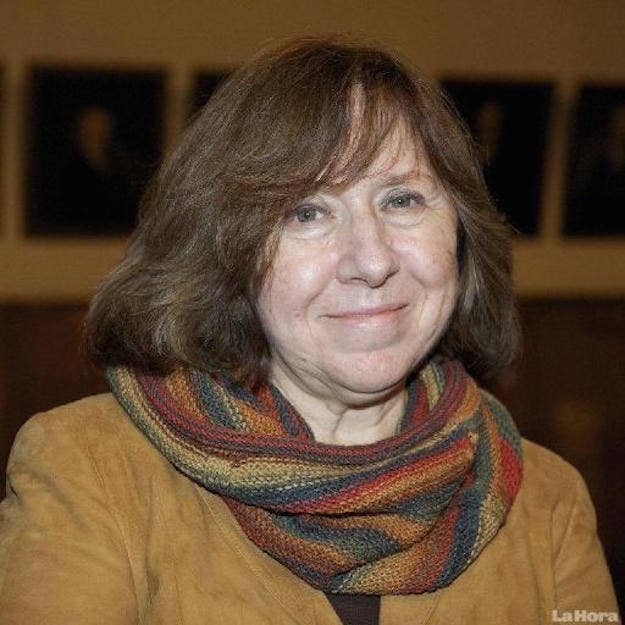
Investigative journalist Svetlana Alexievich of Belarus was awarded the Nobel Prize in Literature by the Swedish Academy on Thursday "for her polyphonic writings, a monument to suffering and courage in our time."
BREAKING NEWS The 2015 #NobelPrize in Literature is awarded to the Belarusian author Svetlana Alexievich
The 67-year-old author has written several books that lend a human voice to major historical events in the former Soviet Union and Russia such as World War II, the Soviet-Afghan War, and the Chernobyl disaster.
When Permanent Secretary Sara Darius broke the good news to the "overjoyed" writer, Darius said she had just one word to say in response, "fantastic."
Alexievich's 40-year career has been spent "mapping the Soviet and post-Soviet individual," Darius said, explaining that she adds a layer of humanity and emotion to her writing.
"She's actually devised a new genre, a new kind of literary genre," Darius said. "It's true achievement."
Nobelprize.org's Julia Chayka spoke to Alexievich over the phone before she headed out to a press conference in Minsk, Belarus. Of her writing she said, "I'm just trying to grasp a piece of reality and tell who we are and where we are going."
"The poetics of tragedy are important for me," she also said.
One of her notable works is her first book The War's Unwomanly Face in which she lends a voice to hundreds of the more than 1 million Soviet women who fought on the front lines during World War II. Darius recommended readers start with this book when exploring Alexievich's work.
"She's offering us a history of emotions, a history of the soul if you wish," Darius said.
Alexievich wrote on her website that when searching for the right genre to use when portraying her "vision of the world," she settled on one where "human voices speak for themselves."
"Real people speak in my books about the main events of the age such as the war, the Chernobyl disaster, and the downfall of a great empire," Alexievich explained.
"But I don't just record a dry history of events and facts, I'm writing a history of human feelings."
Alexievich held a press conference in Minsk on Thursday. "I consider myself a person from the Belarusian world, from Russian culture, and a cosmopolitan of the world," she said.
Speaking about Belarus, she said, "I'm not a barricade person, but time drags us to the barricades, because what's happening is shameful."
Alexievich signs her first book as a Nobel laureate.
She also had critical words for Russian President Vladimir Putin, saying Ukraine has been "occupied and invaded by a foreign power" and that Putin was dragging Russia into an Afghanistan-style war in Syria.
In 2005 she won the National Book Critics Circle Award for her book Voices from Chernobyl: The Oral History of a Nuclear Disaster and in 2013 she was awarded the Peace Prize of the German Publishers and Booksellers Association.
The association said that she has created "her own literary genre — one that resonates all over the world as a powerful choir of witnesses and testimonies."
The writer faced censorship and persecution in her native Belarus after current president Alexander Lukashenko took control of the country in 1994. Her books were no longer published in the country and were removed from the school curriculum. Attacks against her increased over the years, she was banned from making public appearances, and her phones were bugged. In 2000 Alexievich fled Belarus and moved to Paris, spending a decade abroad, after the International Cities of Refuge Network (ICORN) offered her sanctuary. She returned to Minsk in 2011.
Alexievich said that Russia's information minister called to congratulate her after the Nobel announcement was made but that she had not heard from Lukashenko's people saying, "they pretend I don't exist."
She was nominated for the Nobel Prize in 2014 by Ural Federal University. She is the 14th woman to win Nobel's literature honor and was preceded by Alice Munro who was given the award in 2013.
Here's a list of her works in published in English:
* War's Unwomanly Face (1988)
* Zinky Boys: Soviet Voices from a Forgotten War (1992)
* Zinky Boys: Soviet Voices from the Afghanistan War (1992)
* Voices from Chernobyl: Chronicle of the Future (1999)
* Voices from Chernobyl: the Oral History of a Nuclear Disaster (2005)
A Twitter account claiming to belong to the author broke the news nearly two hours before the official announcement.
Swedish Academy awarded to me the Nobel Prize in Literature 2015. I receive now a call from Sweden. I'm happy, very happy! Thanks.
The account later claimed it was a hoax set up by Italian journalist Tommasso Debenedetti.

